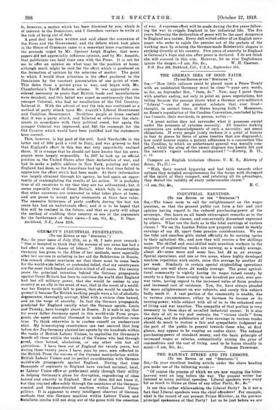THE GERMAN IDEA OF GOOD FAITH.
(To THE EDITOR OF THE " SPECTATOR.") SIR,—" How little reliance could be placed upon a Peace Treaty with an undefeated Germany must be clear "•—your own words, so far, on September 21st, "from, &c." Now, may I point them with another ending, not only in point on peace) negotiations, but telling because the passage shows what a German anti-militarist "Liberal "—one of the greatest scholars that ever lived— thought, in normal times, of States keeping faith ? Mommsen, on Rome's repudiation of the Caudine Convention, concluded bithe two Consuls, their war-lords, in person, writes :—
" A great nation does not surrender what it possesses except under the pressure of extreme necessity. All treaties making concessions are acknowledgments of such a necessity, not moral obligations. If every people justly reckons it a point of honour to tear to pieces by force of arms treaties that are disgraceful, how could honour enjoin a patient adherence to a convention like the Caudine, to which an unfortunate general was morally com- pelled, while the sting of the recent disgrace was keenly felt and the nation's vigour subsisted unimpaired ? "—History, B. II., c. vi.
Compare an English historian (Donne, U. K. S., History of Rome, Pt.. II.) :— " With their wonted hypocrisy and bad faith towards other nations they mingled scrupulousness for the forms with disregard of the spirit of their compact, and retaining all its advantages, they denied the validity of every unfavourable clause."


































 Previous page
Previous page